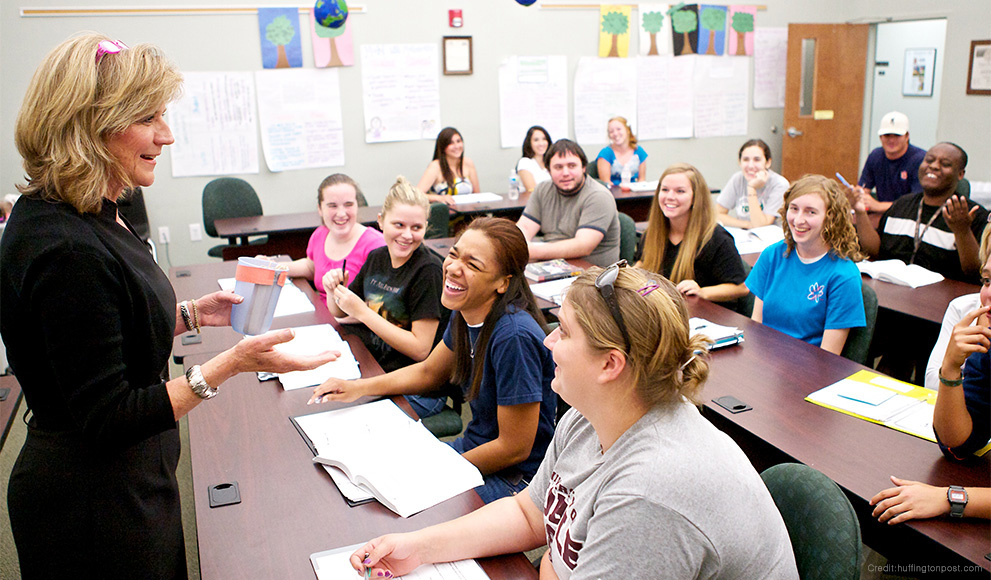Teacher Education And The Liberal Arts Are Part Of The Same Larger Vision And What Education and Learning Should Be About

Wellesley encourages students to use what they learn on campus to improve their communities and make a difference in the world. That might be why so many go into the education field—whether teaching in K-12 or in higher education, or serving in administration, and many more work or volunteer in a variety of educational settings and programs.
"We see teacher education and the liberal arts being part of the same larger vision of what education and learning should be about," said Barbara Beatty, professor of education and department chair. "We believe students should major in a liberal arts subject and minor in education. That's the model for producing good teachers who are going to have the intellectual excitement for different content areas and be able to combine that with their understanding and excitement about how children learn."
Wellesley offers a variety of introductory education courses that give students a broad understanding of key issues, such as the needs of urban and bilingual students; social and emotional development; educational technology; the history of American education; and how privilege, or lack thereof, affects the opportunities available to children. After those broad concepts have been established, students take courses on teaching methods in their subject area, teaching reading and math, and English-language learners. They also begin to engage in field work and to develop their own pedagogical theories and practices.
"Student teachers learn to reflect on their own learning, and on the children and teachers they observe while doing field work," said Beatty. That's crucial for those who want to earn their teacher certification which Wellesley enables them to do by graduation, immediately connecting their liberal arts education to a career. The certification is accepted in all 50 states.
That approach was invaluable for Heather Haines '08, who majored in chemistry and won a Knowles Science Teaching Foundation teaching fellowship in 2008, before earning an M.Ed at Boston College. She began teaching chemistry and physics at the School for Ethics and Global Leadership in Washington, D.C., in 2009, and has taught a combination of chemistry, physics, and AP chemistry at the Community Charter School of Cambridge since 2010, where she is now chair of the science department.
"Barbara [Beatty] and others in the department let me explore big ideas and helped me find my voice," said Haines. "Wellesley taught me to have confidence in my abilities and to find the path that is right for me. I try to instill a sense of mastery in my students, and a sense of wonder. I want them to understand that they are already scientists and that they, too, can use their natural abilities to improve the world."
Stacey Reed '06, a seventh-grade life science teacher in Wayland, Mass., majored in environmental studies at Wellesley and brings the comprehensive approach she learned in those courses to all of her interactions with students.
In the classroom, she emphasizes the important role of reflection in lesson design, always asking, "How can I do this better?" She also teaches students that science connects to many other subjects, and to daily life. "I try to show them that math, social studies, writing, and even world languages don’t have to be separate from science," she said. "Environmental studies helped me to see that, and the broad picture of learning."
Reed is spearheading efforts to make her school's Maker Space—where students can tinker with various materials or build craft/science projects—mobile. "One student is building a spider robot, another is doing duct-tape art. It's important for children to have the opportunity to follow their intrinsic interests to develop their creativity and problem solving skills."
"At Wellesley, I was able to explore the reflective and creative sides of teaching," she said. She is now researching how design and engineering concepts affect children's metacognition while problem solving, and promoting perseverance through the Olin College Summer Experience in Education Research program.
Victoria Volker '16, an American studies major, understands those sentiments. During the summer of 2013, she was hired as an intern by the new system of Austin Achieve charter schools in Texas to develop a social and emotional learning curriculum. Volker, who is pursuing teaching certification for eighth through 12th grades, initially wondered if she was equal to the challenge. What she had already learned in her education courses made her eventually say, "Yes, I am."
"Wellesley has taught me educational theories and frameworks and has given me mentors that allowed me to succeed in teaching even when I was faced with [challenges]," she said. "I think of how much Noah Rubin’s exposing me to theories like ‘emotional work and labor’ have helped me to see the bigger picture in education and find ways to succeed despite challenges."
When Volker returned to campus that fall, she understood why teachers need both theory and real-world practice. "My experiences taught me that theoretical knowledge is necessary and key to defining oneself as a teacher, but until that theory is applied, it sits on a shelf unused," she said.
